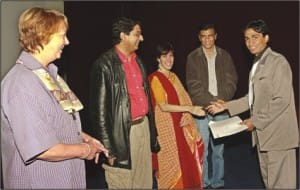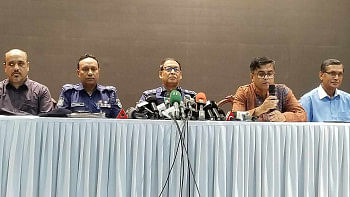Faisal Azam Qureshi on 'digital filmmaking'

Faisal Azam Qureshi next to Dr June Rollinson, director of British Council (L), filmmakers Catherine and Tareque Masud, give away certificate to a participant of the workshop
Faisal Azam Qureshi is a freelance screenwriter, film editor and director from UK who recently came to Dhaka to conduct a workshop on 'digital filmmaking' at the British Council. His passion for filmmaking and willingness to travel brought him to Bangladesh. Invited by the British Council Bangladesh, Qureshi seemed to enjoy his stay in Dhaka. The Daily Star talked to the visiting British filmmaker.
Qureshi has edited a range of programmes from corporate to pop promotional but he is mainly interested in short films. He has directed some short films, the most recent being The Applicant. Prior to this, there was Scribble, which was screened at several film festivals around the world. He has also worked as a screenwriter in both UK and in the US.
Speaking on his involvement with the world of cinema, Qureshi says, “As per my parents' wishes, I took science as my subject in high school. I did my honours in Biochemistry and Molecular Biology. But my real passion has always been cinema. At the age of 19, I was commissioned to work on a film as an editor.”
Qureshi is quite comfortable with all the technical aspects of filmmaking. Editing, screenwriting or directing, which one does he find most interesting? The filmmaker smilingly responds, “All these aspects complement each other. Screenwriting is like playing around with your imagination. When you edit something, you are using someone else's material. But I have earned a reputation for editing. In a way editing a film is like saving it. I would like to call myself the 'editing doctor'. But what I really enjoy is screenwriting and on the whole, I suppose I prefer Screenwriting most.”
A good number of emerging and aspiring filmmakers attended the workshop conducted by Qureshi, and arranged by the British Council. “The objective of the workshop was to give an overall idea of the bureaucracy that goes into the 'digital film production'. Digital filmmaking is a more editing-friendly medium and it's quite inexpensive, thus creating an opportunity for everyone to experiment with filmmaking. But what is important is to know the craft well before you get into it,” says Qureshi.
Is it difficult to shift from analogue filmmaking to digital? The filmmaker's response: “All that matters is the craft of filmmaking, the art of storytelling, the ability to get quality performance from the actor and choosing the shots. Anyone who has a sound knowledge in these aspects can use the digital technology without difficulty. The same director (Danny Boyle) who made The Beach (2000), also made 28 Days Later (2002) in DV (digital video) format.”
Does he think that the DV format can satiate the aesthetic sense of the audience? “Certainly. It depends on the budget of the film and how well you can shoot the scenes to serve your purpose,” says a convinced Qureshi.
His pointers to the young and aspiring filmmakers are quite straight and simple: “Watch a lot of films. Learn your craft and also the whole filmmaking process. And it's also important to know how to compromise.”

 For all latest news, follow The Daily Star's Google News channel.
For all latest news, follow The Daily Star's Google News channel. 



Comments